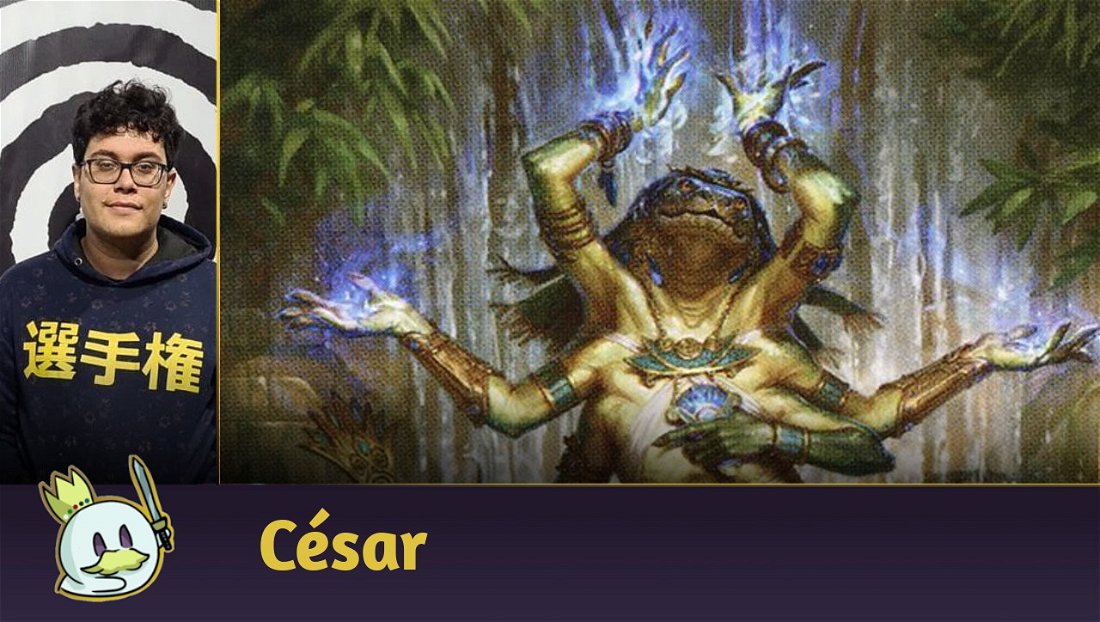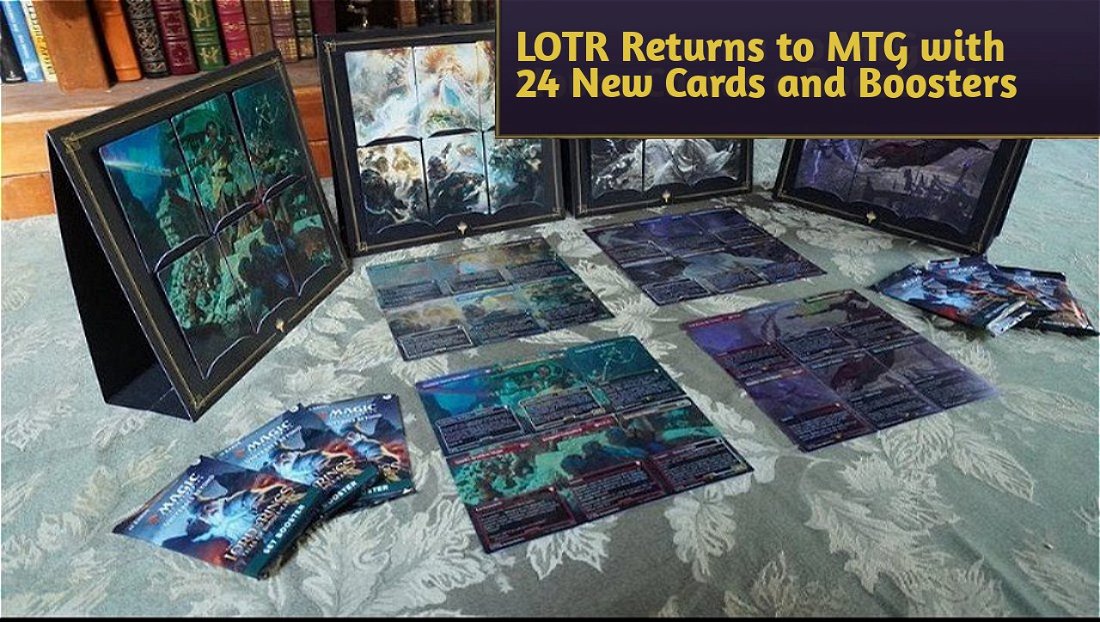The new Standard season with Wilds of Eldraine is in full swing. New ideas and lists have emerged in the last two weeks, and Metagame is starting to show signs of which archetypes will remain at the top.
One of the new features with the new expansion is the Domain Cascade deck, a value-based combo that seeks to cheat on mana to generate an unbeatable board position.
In this article, I present my guide to the latest version of the archetype, as well as my impressions about its future!
What is Domain Cascade?
Domain Cascade is a Midrange-Combo based on the interaction between Invasion of Alara and *Adventure cards - more specifically, Bramble Familiar.

Invasion of Alara has an ability similar to the Cascade mechanic, launched in Alara Reborn, in 2009. Through it, the battle finds two cards with a mana value of four or less, and casts them without paying their cost.
However, the way the ability is described, Invasion of Alara works in the same way that Cascade operated before its errata, where it only checks the mana value stamped on the card's main cost to determine whether it can be cast, while allowing you to play any side of it, including Adventures.

When casting Bramble Familiar's Fetch Quest for free, the deck will find a bomb at the top to generate an absurd amount of card advantage: if it finds Cemetery Desecrator, it will remove the Invasion of Alara's counters and cast its other side.
If it finds Etali, Primal Conqueror, its controller gets a 7/7 with Trample and two more spells to cast for free. If it finds Atraxa, Grand Unifier, the player will have three or four extra cards in their hand, in addition to a 7/7 with a keyword soup.

To complement the strategy, the list runs the same core used by Domain Ramp, and seeks to take advantage of the extensive use of Triomes to cheat on mana costs and avoid the use of spells that disrupt its main mechanics.
Decklist
The list above is based on a conglomeration of choices I saw in the Maindeck and Sideboard of the various versions of Domain Cascade that appeared in Leagues and Challenges, and changed based on my experience in Magic Arena ranked matches.
Maindeck

Our combo. The deck wouldn't exist without it, and four copies of each card are required to ensure consistency.
While Invasion of Alara is a linear card that has a single function in the list, there are games where casting Bramble Familiar on the second turn to accelerate mana or block is beneficial to avoid the opponent's race for a turn.

Our payoff. Each of them offers an efficient advantage, with emphasis on Cemetery Desecrator which, with two copies in play and/or alongside a discarded Herd Migration, can remove the counters from Invasion of Alara to cast Awaken the Maelstrom.
Virtue of Persistence doubles as early game removal and late game win condition. Reanimating a creature every turn is an efficient method of winning games, especially if we are reanimating our own bombs.
Elesh Norn, Mother of Machines is a choice that worked well in the maindeck for Game 1 due to the accidental values she generates while in play: a 4/7 body for five mana is difficult to bypass, while its ability to block the opponent's ETBs is very useful in some cases, not to mention the absurd card advantage it generates alongside our other threats.
Etali, Primal Conqueror and Atraxa, Grand Unifier are the main bombs available in the format today, and their inclusion seems relatively obvious in the list. However, as they are legendary permanents, we don't want to get multiple copies of them with our combo, and our list doesn't ramp well enough to cast them quickly.

Our early game package has some cards that can bypass mana costs to be played early. Herd Migration allows you to find the necessary colors while being reusable with Cemetery Desecrator, as well as becoming a late-game threat.
Leyline Binding is the best removal available for Domain decks, and the main interaction against Sheoldred, the Apocalypse and other must-answer threats. It is complemented by the single copy of Go for the Throat.
Phyrexian Fleshgorger is our means of trying to hold off aggressive archetypes for a turn or two. Additionally, it is found with Fetch Quest, and comes into play as a 7/5 with Lifelink and Menace, making it a difficult threat for decks like Mono Red Aggro.

As we need different colors and land types for our game plan to work, the deck runs with 13 copies of the Streets of New Capenna Triomes, including those that generate green mana in the first turns.

We also have a Llanowar Wastes playset to give us more access to our main second-turn plays, such as Herd Migration and the Virtue of Persistence adventure. The other lands are one-ofs, which seek to complement our access to multiple colors in the first turns.
Sideboard

As the Metagame expands, the need to deal with Aggro decks becomes more evident. Sunfall is the best unconditional sweeper that doesn't come up against the mana values for Invasion of Alara.
Another option, better against Mono White and Soldiers, is Vanquish the Horde. However, there are games where we want a sweeper to perform more efficient trades, and in this sense, Sunfall generates more value and is easier to cast for this purpose.
Colossal Skyturtle is one of the few early-game interactions we can have due to our deckbuilding concessions. I saw some lists running Horned Loch-Whale, and while the new creature seems more efficient against Control, Skyturtle works better against a Thalia, Guardian of Thraben, and its recursion ability matters a lot in attrition games, plus a 6/5 that protects itself and has evasion can win games.

The Kami War and a second copy of Elesh Norn are our main elements for card advantage games. The multicolored saga works excellently alongside Herd Migration and other of our high-cost cards, and also works as another win condition, in addition to comprehensive removal.

Virtue of Loyalty has been growing in popularity this week, while Virtue of Persistence and Wedding Announcement have become staples. Therefore, we need answers to deal with enchantments.
Stormkeld Vanguard isn't as impressive as Kogla and Yidaro at generating value, but there are times when we just need a clean, cheap answer against these permanents.

Mirrorshell Crab is the only "counterspell" we can run, and there are several moments where I feel that it is terrible in this regard. Despite the advantages of countering abilities and not being able to be countered by conventional means, three mana is a high value for a Mana Leak in Standard, and there are countless games where we don't have the necessary time to hold three mana unless we pass the turn without taking any action.
It's a card that's great when it works, and terrible when it doesn't.
Thrun, Breaker of Silence and Tyrranax Rex are our complementary threats in more interactive games, where we take advantage of the fact that all our creatures need an immediate answer to further force our board position.
Sideboard Guide
The Standard Metagame remains unstable, and we have a high variety of decks in ranked matches. The guide below seeks to cover the main archetypes that have emerged in the last two weeks.
Mono Red Aggro
IN

OUT

Golgari Midrange
IN

OUT

UWx Control
IN

OUT

Dimir Faeries
IN

OUT

Mono White Aggro
IN

OUT

Esper Legends
IN

OUT

Domain Ramp
IN

OUT

Domain Cascade
IN

OUT

Domain Cascade and the Current Metagame
Last week, when the first Challenge results came out, it looked like Domain Cascade would become the deck to beat this season, as Combo lists with an alternative and efficient game plan tend to dominate Standard.
Reality, however, has shown that this archetype has many flaws that are easy to capitalize on, with the main one being cost restrictions: the need to limit our cards based on mana values greater than five gives us several sub-optimized interactions, especially in post-Sideboard games, where we don't have the best means of holding Aggro, nor the best answers to resolve our spells against Control.
An alternative to this plan would be to hybridize this strategy with Domain Ramp, given that the core of both lists are similar. But this makes our game proposal worse, as we limit our Sideboard space to transition to a proposal that suffers from the same problems - speed and consistency.
This archetype stands out in value games, especially in those where your opponent is not as quick as you're in accumulating resources and/or has a limitation on how much they can do in a single turn. Non-blue Midranges are favorable matchups, while Ramp strategies require more steps and less luck to achieve the same results as us.
Without substantial changes or new approaches, Domain Cascade doesn't seem to have enough qualities to compete with less restrictive strategies. Decks like Dimir Midrange, Esper Legends, Golgari Adventures and Mono Red Aggro seem to have less polarized matches in the current Metagame.
On the other hand, this strategy needs to be respected in non-Sideboard environments, and I wouldn't be surprised if, with a build more focused on dealing with Mono Red and Mono White, it remained one of the main competitors for Best of One in Magic Arena.
Conclusion
That's all for today.
Domain Cascade is a deck that I recommend for players who like to create absurd situations and cheat on mana costs, and for those who like combos. Its assembly in Magic Arena requires several rare and mythic wildcards, but many of its cards - especially in the mana base - are reusable in other formats, such as Explorer and Historic.
It is not an archetype that I would recommend for players who are starting out or who are curious about learning Standard. Its matchups are very polarized, and it has consistency problems with access to different colors. Furthermore, this is a list that often works in "automatic" mode, which strategy tends to create a tedious experience after a few days or weeks.
Thanks for reading!














— Comentarios 0
, Reacciones 1
Se el primero en comentar